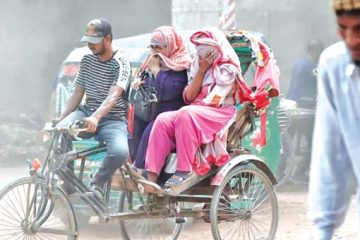Opinion
Musharraf Tansen
AS THE world grapples with the escalating consequences of climate change, it has become clear that today’s youth are not only the most affected but also the most fervent advocates for change. Young people across the globe are stepping into critical roles as climate activists, leaders, innovators, and educators, determined to shape a sustainable future for themselves and future generations. As the urgency to address climate change intensifies, the role of youth in climate action has proven essential in driving global awareness, promoting sustainable practices, and advocating for policy change.
In Bangladesh, one of the nations most vulnerable to climate change, the involvement of youth in climate action has become increasingly essential. The impacts of climate change are starkly visible across the country, with rising sea levels, floods, cyclones, and erosion affecting millions. Young Bangladeshis, recognising the threat to their futures, are leading efforts to build a sustainable and resilient society. By engaging in climate advocacy, innovation, education, and community resilience, Bangladeshi youth are shaping the nation’s response to one of the greatest challenges of our time.
Bangladesh and the urgency of climate action
BANGLADESH has long been at the frontline of the climate crisis. With a vast deltaic region prone to severe flooding, coastal areas threatened by rising sea levels, and extreme weather events like cyclones becoming more frequent, the climate impacts here are severe. More than 20 million people live in the country’s coastal regions, where seawater intrusion is making land unusable and disrupting agriculture, one of the country’s key economic sectors. Moreover, riverbank erosion and climate-related displacement force millions to migrate to urban areas, putting strain on city infrastructure and resources.
This grim reality has not discouraged young people in Bangladesh; instead, it has motivated them to take action. Across the country, youth are coming together to tackle climate change at all levels — whether in rural communities, urban neighbourhoods, or on national and international stages. Their efforts underline a deep sense of responsibility for their future and a commitment to mitigating climate impacts in one of the most vulnerable countries in the world.
Youth advocacy and climate movements in Bangladesh
YOUTH advocacy in Bangladesh is becoming a powerful force for climate action. Young activists, inspired by global movements and fuelled by their own experiences with climate impacts, are rallying for policy change and demanding accountability. Groups like YouthNet for Climate Justice, PCYCLE, Brighters and the Fridays for Future Bangladesh chapter are amplifying youth voices, calling for stronger climate policies, and highlighting the urgent need for adaptation and resilience measures tailored to the nation’s needs.
Through marches, rallies, workshops, and social media campaigns, these youth-led initiatives are raising awareness across the country. Digital platforms have been especially crucial in connecting Bangladeshi youth with global movements, allowing them to share their stories, organise events, and reach out to stakeholders locally and globally. By voicing the struggles of climate-affected communities and advocating for policies that support environmental sustainability, Bangladeshi youth are ensuring that climate action remains on the national agenda.
Young innovators driving local solutions
BANGLADESHI youth are demonstrating remarkable ingenuity in finding local solutions to climate challenges. Given the country’s agricultural dependency, young people are exploring sustainable farming techniques that reduce environmental impacts and enhance resilience to changing climate patterns. Many young entrepreneurs are working on projects to promote climate-smart agriculture, including the development of drought-resistant crops, aquaponics systems, and organic farming practices.
Furthermore, youth-led organisations are experimenting with small-scale renewable energy projects, like solar-powered irrigation and portable solar lights for rural areas without reliable electricity. The innovation in the waste management sector, led by startups, is also noteworthy. For example, youth groups are introducing recycling programs and promoting biodegradable alternatives to plastic, addressing the waste issues that exacerbate urban flooding during monsoon seasons. These efforts underscore the role of Bangladeshi youth not only as advocates but as innovators and problem solvers capable of driving tangible change.
Climate education and community awareness initiatives
CLIMATE education is a critical area where young Bangladeshis are making a significant impact. Schools, universities, and community-based organisations are seeing a rise in youth-led climate literacy programmes, often conducted in partnership with NGOs. By educating peers, family members, and local communities, young people are spreading awareness about the causes and consequences of climate change, as well as the importance of sustainable practices.
For instance, young volunteers from programmes like Bangladesh Youth Environmental Initiative (BYEI) hold workshops in rural areas to explain the importance of conservation and practical solutions like tree planting, water management, and organic farming. In urban settings, they promote waste reduction, recycling, and energy conservation practices. These grassroots efforts not only raise awareness but also foster a generation that is better informed and more responsible in their daily environmental practices.
Building resilient communities through localised adaptation
AS CLIMATE impacts grow more intense, young Bangladeshis are actively working on adaptation strategies in their communities. Localised adaptation initiatives include projects to reduce the effects of flooding, improve water resource management, and protect coastal areas. In many rural areas, youth-led initiatives focus on planting mangroves, which help prevent erosion and act as natural barriers against storm surges, protecting vulnerable coastal communities from cyclones.
Community-based organisations are also empowering youth to engage in disaster preparedness training, equipping them with the skills needed to respond to climate-induced disasters like cyclones and floods. By strengthening local resilience, these young leaders are helping to protect livelihoods, infrastructure, and the environment.
The role of youth in policy advocacy
BANGLADESHI youth are increasingly active in policy advocacy, recognising that addressing climate change requires systemic changes. Through partnerships with NGOs, think tanks, and environmental networks, they are engaging with policymakers to shape climate policies that prioritise adaptation, resilience, and equitable development. Youth activists in Bangladesh call for fair international climate financing and urge developed countries to honour their commitments, particularly to nations that bear the brunt of climate change yet contribute the least to global emissions.
Their advocacy efforts have not gone unnoticed; youth voices are now present at national climate forums, and young Bangladeshi representatives participate in international conferences like COP and COY, where they press for policies that consider the unique needs of climate-vulnerable countries like Bangladesh.
LCOY in Bangladesh
THE Local Conference of Youth, LCOY, initiative in Bangladesh is part of a global movement organised under the umbrella of YOUNGO, the official youth constituency of the UNFCCC. It brings together young people from across Bangladesh to discuss, strategise, and advocate for climate action and sustainability. The conference serves as a platform for youth to raise their voices, share ideas, and propose actionable solutions to address climate change challenges unique to Bangladesh.
Through workshops, panel discussions, and interactive sessions, LCOY Bangladesh equips young participants with knowledge on climate policy, sustainable practices, and advocacy skills, helping them engage meaningfully in national and international climate dialogues. The outcomes of LCOY Bangladesh are often shared at the COY and COP meetings, amplifying the voices of Bangladeshi youth in global climate negotiations and fostering their active role in shaping a sustainable future.
Challenges and the need for support
DESPITE their dedication, Bangladeshi youth face challenges in accessing the resources and institutional support needed to scale up their efforts. Limited funding, lack of access to decision-making platforms, and the need for training and technical resources are common hurdles. Additionally, in many rural and remote areas, connectivity and infrastructure constraints hinder the impact of youth-led initiatives.
To fully harness the potential of young people in climate action, government institutions, international organisations, and the private sector must step up support. This includes providing funding for youth-led projects, creating educational programs that incorporate climate resilience training, and ensuring that young voices are included in policy discussions at all levels. With adequate support, the contributions of young Bangladeshis can be even more impactful.
Youth as a driving force for a sustainable future
THE role of youth in climate action in Bangladesh is indispensable. These young individuals, shaped by a deep connection to their communities and driven by a desire for a sustainable future, are bridging the gap between local needs and global climate goals. They are not only responding to the immediate impacts of climate change but also working to build long-term resilience, striving for a Bangladesh that can thrive despite climate challenges.
Through advocacy, innovation, education, and community leadership, Bangladeshi youth have shown the potential to lead transformative change. As they continue to mobilise for climate action, their voices grow louder, their impact more profound, and their contributions more essential. The future of climate resilience in Bangladesh is in capable hands, and with increased support and recognition, Bangladeshi youth can play an even greater role in securing a sustainable and resilient nation for generations to come.
Musharraf Tansen is former country director of Muslim Hands International and former country representative of Malala Fund.







